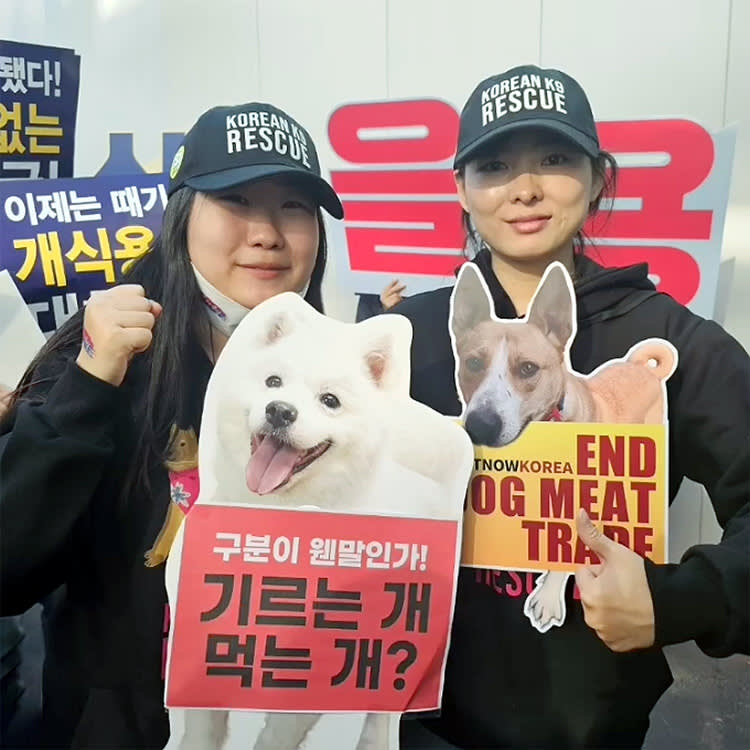South Korea Passes Bill to Ban Their Dog Meat Industry—“This Is History in the Making”
The legislation aims to end the practice by 2027. Here’s what you can do to help right now.

share article

Your pet wants you to read our newsletter. (Then give them a treat.)
After years of growing opposition from local and international organizations alikeopens in a new tab, South Korea has passed a bill to end the South Korean dog meat trade by 2027. The People Power Party of South Korea proposed the legislationopens in a new tab in November, and it passed Tuesday by a unanimous 208 votesopens in a new tab, with two abstentions.
“This is history in the making. I never thought I would see in my lifetime a ban on the cruel dog meat industry in South Korea but this historic win for animals is testament to the passion and determination of our animal protection movement,” said JungAh Chaeopens in a new tab, executive director of Humane Society International/Korea, in a statement. “While my heart breaks for all the millions of dogs for whom this change has come too late, I am overjoyed that South Korea can now close this miserable chapter in our history and embrace a dog-friendly future.”
According to Humane Society International (HSI), the dog meat trade is responsible for the deaths of roughly 30 million dogs each year. One million of those deaths occur in South Korea, where there are large-scale breeding farms. “Dogs on South Korean meat farms are kept locked in small, barren metal cages, left exposed to the elements and given just enough food, water or shelter to keep them alive,” the HSI reportsopens in a new tab.
The dog meat’s trade declining popularity
In recent years, the industry has faced massive scrutiny. “I mean 10 years ago, it was a different story. There were 17,000 dog-meat farms across the country, in the countryside,” said Gina Boehleropens in a new tab, founder of Korean K9 Rescueopens in a new tab, an organization dedicated to rescuing and rehabilitating dogs who are victims of the dog meat trade. “Rescue organizations in Korea say now it’s about half of that or less. It’s a very small segment of the population that actually consumes dog meat. Nobody thinks it’s a good thing.”
In fact, a 2022 pollopens in a new tab showed that only eight percent of South Korean respondents had eaten dog meat in the past year, and 64 percent opposed the practice completely — down from 27 percent in 2015. The younger generation is especially unlikely to eat dog meat; the most cited reason for dog meat consumption is societal pressure from older family members.
New legislation in South Korea
The new bill will ban the meat trade and the breeding of dogs for slaughter. The legislation gives a three-year grace period to allow businesses to transition out of the trade. Farmers and restaurant owners can apply to receive compensation and government support during the closing or transitioning of their businesses.
Under the new law, breeding dogs for meat “will be punishable by up to three years in prison or 30 million won ($22,800) in fines,” reports Reutersopens in a new tab. The bill does not specify any punishments for eating dog meat.
How you can help
Activists are hopeful that other countries will follow South Korea’s example. In the meantime, during South Korea’s three-year grace period and in countries not yet enacting bans, there are still many ways to help.
Peter Li, the China Policy Specialist at Humane Society International, told The Wildestopens in a new tab in a previous interview that one way to help is to dismantle misinformation. “There is a misconception about people wanting to eat dog meat, or that there is a consumer demand for dog meat. This is a false perception. It is a consumption driven by the traders. Dog meat is not a household food,” he said.
Asia for Animals Coalitionopens in a new tab, Duo Duo Projectopens in a new tab, Korean K9 Rescueopens in a new tab, the Soi Dog Foundationopens in a new tab, and Harbin Slaughterhouse Survivorsopens in a new tab are a few of the organizations continuing the work to end the dog meat trade. You can support their work by spreading their message, sending donations, and adopting available dogs who were rescued from the meat trade.

Sio Hornbuckle
Sio Hornbuckle is a writer living in New York City with their cat, Toni Collette.
Related articles
![Animal activists hold banners against Yulin Dog Meat Festival in front of Yulin City Representative office in Beijing, China, June 10, 2016.]() opens in a new tab
opens in a new tabHow You Can Help Stop the Yulin Dog Meat Festival
On June 21, thousands of dogs will be slaughtered in Yulin, China. Organizations working to ban this barbaric event need your help to raise awareness now.
![A brunette woman holding a black dog with a blue collar, she is wearing headphones and a microphone attachment while seated in a plane with the clouds and sky showing through the window]() opens in a new tab
opens in a new tabPilots to the Rescue Has Flown Nearly 400 Animals to Safety This Year
With the help of flight, this nonprofit is saving animals and relocating them to loving homes across the country.
![Group of young people pet a brown dog with a jacket on outside.]() opens in a new tab
opens in a new tabHow DIY Animal Rescuers Tell The Exhausting, Rewarding Stories of Their Work
In volunteers’ Instagram videos, you’ll see both the joy and the fatigue behind finding these deserving pets homes.
![My Pit Bull is Family]() opens in a new tab
opens in a new tab“My Pit Bull is Family” Fights For the Big Little Guys
The fair-housing org’s journey from bumper stickers to databases.
![Douglas Thron, in his rescue pilot uniform hugging a rescued black cat to his chest outside]() opens in a new tab
opens in a new tabWe Are Now Living in the Age of Drone Animal Rescue
ASSERT is the first on the ground for emergency aid around the world.






